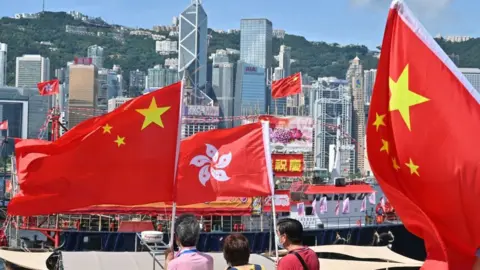Hong Kong: How is it run, and what is the Basic Law?
 Getty Images
Getty ImagesWhen Hong Kong was handed back to China following more than 150 years of British control, the "one country, two systems" principle was established as the foundation of the relationship.
While Hong Kong is part of China, the policy has given the Special Administrative Region (SAR) a high degree of autonomy.
Here is a breakdown of how this unique system works.
What is Hong Kong's Basic Law?
The "one country, two systems" principle is enshrined in a document called the Basic Law - Hong Kong's mini constitution.
It was created from an agreement between Britain and China and came into effect on 1 July 1997, the day Hong Kong returned to China.
The Basic Law protects rights such as freedom of assembly and freedom of speech - which do not exist in mainland China - and also sets out the structure of governance for the territory.
These protections for Hong Kong's way of life are only valid for 50 years - although Chinese officials have recently indicated they could potentially be extended beyond 2047.
How is Hong Kong governed?
Hong Kong is ruled by a chief executive with support from a formal body of advisers called the Executive Council.
The chief executive is responsible for implementing the Basic Law, signing bills and budgets, promulgating laws - declaring them as in effect - and issuing executive orders.
The city also has a two-tiered semi-representative system of government: the law-making Legislative Council and district councils, as well as an independent judiciary.
How is Hong Kong's chief executive chosen?
Currently, the chief executive is elected by an Election Committee of 1,500 people, who are in turn chosen by representatives of various sectors in Hong Kong - who only make up a small percentage of the electorate.
After the election, the chief executive must be formally appointed to the role by the central Chinese government.
The Basic Law states that the "ultimate aim" is for the chief executive to be selected by "universal suffrage upon nomination by a broadly representative nominating committee".
What is the Legislative Council?
LegCo, as it is widely known, makes and amends Hong Kong's laws.
It is currently made up of 90 seats. Of these, 40 seats go to MPs chosen by the Election Committee while another 20 seats are directly voted for by the public.
Another 30 seats represent "functional constituencies" - these are voted for by smaller groups representing special interests, primarily businesses, banking and trade.
How do Hong Kong's district councils work?
Each of Hong Kong's 18 districts has its own local council, whose members are voted in by the public.
Elections take place every four years. In the 2020-23 cycle, there are a total of 479 seats - 452 of which are directly elected, and the remaining 27 automatically going to the elected representatives of Hong Kong's tiny rural populations.
The district councils have very little actual political power. They're primarily advisory, acting as the eyes and ears of the government at a local level, passing on information about public facilities and services and how funds should be used.
They also have access to some funds to spend on environmental improvements or community and cultural projects.
But because they give the Hong Kong public a rare chance to vote directly, they can sometimes be seen as a litmus test of public sentiment towards the ruling government.
For instance, in 2019 pro-democracy candidates won by a landslide victory, in what was seen as a sign of public unhappiness with the Hong Kong government.
How much control does China have over Hong Kong?
Besides controlling Hong Kong's defence and foreign affairs, Beijing has wielded increasing political power over the city.
It has introduced various restrictions to Hong Kong's electoral processes over the years. The latest round was in 2021 with reforms aimed at ensuring only "patriots" could run for the chief executive and LegCo elections.
The Election Committee, which has immense power in deciding who gets to lead Hong Kong and enter its parliament, is also stacked with pro-Beijing loyalists.
In addition, a separate screening committee vets any prospective MP, member of the Election Committee or chief executive candidate, making it easy to bar anyone deemed as being critical of Beijing.
Under the Basic Law, Hong Kong's courts are responsible - "within the limits of [its] autonomy" - for determining whether the government's actions are legal.
But the National People's Congress Standing Committee (NPCSC) - China's top law-making body - holds the ultimate "power of interpretation".
In 2020, the NPCSC passed the controversial national security law for Hong Kong which criminalises any act of secession, subversion, terrorism, or collusion with foreign forces.
This came about after the widespread 2019 protests which saw violent clashes between protesters and police. Critics say the law has hushed political dissent.
Following all these changes, some say that China has breached the "one country, two systems" principle for Hong Kong.
The British government has said, for instance, that the national security law was a "clear and serious" violation of their agreement with China.
But China has rejected such charges and accused others of "interference in China's internal affairs".
